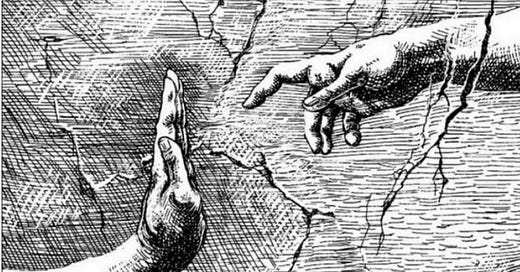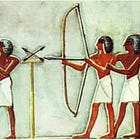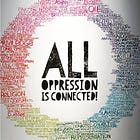[Image retrieved from https://geneticliteracyproject.org/2018/11/06/viewpoint-what-new-atheists-get-wrong-about-science-and-religion/]
CONTENTS:
PROLOGUE: The Oxford Union has betrayed British Values
INTRODUCTION: Who’s afraid of grand narrative?
BOOK 1: LANGUAGE: THE MODERN TOWER OF BABEL
1.1: Living a Lie
1.2: Corruption of the Masses
1.3: The Dangerous Confusion of Language
1.4: The Great Genocide Lie
1.5: Hands off Churchill!
1.6: In Praise of the British Empire for Abolishing Slavery Worldwide
1.7: Declaring War on Post-Modernism
1.7.1: Part 1: With “Authentic Feeling”
1.7.2: Part 2: A Genealogy of "Woke" Linguistics
1.8: The Problem with Atheism
1.9: Justice Lost
1.10: Word Inflation
1.11: Thou Shalt Not Lie: On the Destruction of Worlds
1.12: Freedom of speech?
1.13: Democracy cannot survive in a world that accepts lies as truth
1.14: The Silent Image
BOOK 2: TRUTH: ON THE BIRTH OF HUMAN AGENCY
BOOK 3: SOVEREIGNTY: ON THE DEMOCRATIC NATION
BOOK 4: NARRATIVE: ON THE FULFILMENT OF MEANING
BOOK 5: FREEDOM: ON WRITING THE NEXT CHAPTER
BOOK 6: COVENANT: ON CREATING A NATION OF NARRATIVE
BOOK 7: NATIONHOOD: ON EXPANDING THE NARRATIVE
BOOK 8: LEADERSHIP: ON REACHING THE PROMISED LAND
BOOK 9: PEACE: THE END OF THE JOURNEY
The Problem with Atheism - Chapter 1.9
Time for modernist humility in the face of certain ignorance
Kindergarden religion
“The God of the Old Testament is arguably the most unpleasant character in all fiction: jealous and proud of it; a petty, unjust, unforgiving control-freak; a vindictive, bloodthirsty ethnic cleanser; a misogynistic, homophobic, racist, infanticidal, genocidal, filicidal, pestilential, megalomaniacal, sadomasochistic, capriciously malevolent bully.”
―Richard Dawkins defines “The God of the Old Testament”, The God Delusion
Richard Dawkins is an intelligent man. He’s a professor after all; and in his field of biology his expertise is indisputable. Yet when he turns his hand to religious philosophy, he demonstrates a somewhat amateurish grasp of the subject.
Many were the Sunday mornings of my youth, I spent watching debate shows1; and without fail, Professor Dawkins - or another of the so-called New Atheists - would announce his presence arguing with (or rather mocking) a fundamentalist Christian. Oh how he laughed at claims that the Earth was created in seven 24 hour spans of time! And having elevated upon high a straw-manned caricature of religion, he would swiftly knock it down to the satisfaction of all adults present.
But the smugness of the cream of Oxford intelligencia is quite unjustified. For if you are going to take a kindergarden view of God and dismantle it, don’t expect the intelligent theist to be impressed2. It is hardly a revelation to discover that a childish view of God is in fact childish. Or that principles taught in Class Aleph at Sunday School are somewhat porous3. Richard Dawkins defines God in such a way that it is easy to cast doubt: An all-powerful, ever-present superbeing with human features and morality4. And in doing so he shows unfortunate ignorance of the philosophy of language; a matter to which we will shortly turn.
But before we embark on that linguistic quest, we would do well to make the following preliminary comment. We are thankful for modernist intellectuals. They fight the good fight for truth in a world of lies. They speak up for reason in a world of emotional assertion. In an fearful, political landscape where we criticise religion (one in particular) in fear of our lives5, Dawkins gives us hope that the light of truth-seeking will never be extinguished. While post-modernists seek to confuse language, modernists seek to define universal elements in precise terms. Where postmodernists sow the seeds of confusion, modernists direct us forward towards progress.
But that which can be clearly defined in the world of physical reality cannot be so easily captured in the domain of the abstract. And, as we shall see, there is nothing more abstract than God. Matters which are more properly encountered in the realm of personal experience; ideas which express personal values and traditions long evolved; cannot be reduced, equation-like, into a simple sentence. There, where empiricism is inapplicable, modernists should show some humility; for in the face of the finite, ignorance is oft the best response. Through overreach, nay childish simplicity, the biologist devalues scientific wonder in an exploration of meaningless folly.
From the concrete to the abstract: The problem of definition
Let us begin at the most concrete of levels. If I were to ask you all to picture a pen, different images would no doubt flash into your minds, but all these pictures would fit within the accepted view of the target word. Yours might be a fountain pen. Mine may be a biro. And perhaps we would struggle to come to an absolutely agreed-upon definition of the term. Yet for all practical intents and purposes, we are in agreement. This is a pen and that is not.
But the greater the abstraction, the greater the difficulties we encounter. Take the word of the moment: Zionism. I was always brought up to believe that Zionism was the national movement for Jewish self-determination with the particular belief that this self-determination was to be realised in the Land of Israel6. I didn’t attribute any overt political characteristic to the term greater than that already enunciated. You could be a left-wing peacenik Zionist or you could be Bezalel Smotrich7. You could be a non-Jew like Joe Biden8, a resident of the State of Israel or an earnest supporter from the sidelines. But apparently not everyone agrees. Many Zionist movements are ideologically committed to the idea that only those who move - or “make aliyah” - to the State are “true Zionists”9. In Israeli coalition discussions, party heads often claim that they are only willing to make agreements with “Zionist” parties; which bizarrely include Haredi factions that are at best agnostic, at worst outright hostile, to the political idea of modern Israel. And anti-Israel protesters often use “Zionist” as a hate word equivalent to Nazi. Not all these positions can be simultaneously true; and so here we see just one example of the difficulty in defining abstract terms.
But if political ideologies are difficult to define - and thereby to attack or defend - they are nothing as compared to religious labels. A cursory look at Youtube will confront you with debates of the type “Is Islam a religion of peace?”10 and those who demur often cite the ever-increasing threat of terrorist violence from Islamist factions. But just because Muslims are disproportionately involved in acts of extremist violence11, it can hardly be said to follow that Islam as a whole - with its more than a billion adherents, multiple internal belief systems and immensely varied cultural contexts - is inherently warlike12. For its detractors to define Islam in such a negative way - as an essential enemy of peace - is as manifestly erroneous as that of its supporters ignoring the evidence of atrocities committed in its name.
One is equally tempted to roll one’s eyes upon hearing of “Christian values13”; as if these values were the very essence of the good. Any history textbook will show you that both immense good and immense evil have been committed in the name of Christianity (indeed in the name of all ideologies)14; thus “Christian values” amounts to a quasi- worthless label used to encourage children to be nice.
Yet despite the problems of definition, it would be inaccurate to say that Christianity and Islam are synonymous with any definition you care to give them. There are clearly distinct features of both; but they are imbued with so many varied global practices, that to pin down a pithy definition for either is a thankless task. Put simply, it is inappropriate to pigeon-hole them with binary definitions like peaceful or warlike.
As we climb the levels of abstraction so too do the problems of definition increase. Love and joy, progress and kindness: these are ideas that we are quick to use in conversation, all the while having subtly different understandings of their essential content. We use them in a common language without necessarily having the same intellectual framework. “Love is all we need” claimed the Beatles. But what is love? And what do we need? Rather fundamental one would think when trying to find a life partner or attempting to construct a meaningful life together. Each abstract term is worthy of a history’s worth of essays. But far from being a mere exercise in semantics, these concepts are practical ideas that form the basis of every person’s life.
God: The ultimate undefinable abstraction
But while “pen” may be child’s play, “Islam” may be complex and “love” may be agonising, the abstract term of all abstract terms is “God”. A debate on the meaning of Zionism may bring out long-hidden passions - all in the name of defining a term that escapes easy definition - but God? God is a concept that almost by definition cannot be defined. The non-definition of God is perhaps “His” very essence.
The human being is touched by mystery. The unexplained bliss. The sense of destiny. The miraculous coincidences. We have all experienced it. And some sense even more than that: The intense sensation of the unfinished book of history. We all feel the need to have it named. And though it is fashionable to describe this as “the universe”15 - or some other term conveniently divorced from the long centuries of human religious thought - most of us plump obediently for “God”. Yet whatever the word you use, it amounts to the same thing. The same idea. The same painfully indefinable concept. For although naming is difficult, definition is impossible. And it is for this reason that writers since the beginning of time have tried to wrap God in poetry; to use human features, emotions and morality to explain what this mysterious force is doing.
When the Torah speaks of God’s outstretched arm or God’s back or Moses speaking to God “face-to-face”16, these are patently not literal descriptions. They are an attempt to put into words an unexplainable mystery through a lens that humans can both explain and understand17. God’s “outstretched arm”, a clearly metaphorical image, may make us think of sheep being gathered in by a shepherd or of a loving parent removing us quickly from harm’s way. It is a beautiful explanation of how it must have felt to be freed - overnight - from 400 years of bondage. These are poetic descriptions which resonate with us; which help us understand the extraordinary nature of these biblical events. And to this day, poets and writers, with no more than the humble tools of the language bequeathed to them, continue to explain the inexplicable with the little vocabulary that we have at our disposal. God’s nature is a mystery because mystery - the inexplicable but palpable - is precisely what God is. We know nothing of God, only “His” actions; and (of course) the fact that “He” isn’t really a he at all.18 That was true when Maimonides wrote his seminal work “The Guide to the Perplexed” and it continues to be true today.
Unfortunately for Richard Dawkins, he hasn’t read the famous Guide. Nor even, it seems, a basic primer on the philosophy of language. For if he had, he would not take the one word that we dare not even attempt to define and do so with all the philosophical sophistication of a 4 year old. Dawkins' God is an old man on a cloud with a magic stick. He’s angry. He’s jealous. “He’s” a he. And most of all he’s a human-like being in all but name.
For Dawkins to claim that God doesn’t exist is true in the simple straw man terms he chooses to set. But if God is the undefinable mystery that touches each and every one of us; if God is the unexplained miracles that we feel but cannot see; and if this mystery is evidenced through human experience the world over, then Dawkins’ atheism mission has hit the rocks in ignorance. For if God cannot by definition be defined, then how can “He” be disproved? If there is evidence of vast human personal experience, then how can a scientist turn a blind eye? Perhaps it is fair for Dawkins to say that there is insufficient evidence that this mystery definitively exists, but that is quite different from atheism which self-defines the indefinable like a child, then claims a total lack of evidence and finally dismisses dissenters as superstitious.
In his early phase, Ludwig Wittgenstein proposed a picture theory language, claiming that statements are only meaningful if they can be defined or pictured in the real world19. If a proposition can picture a state of affairs that pertains in reality then it can be mutually understood20. Otherwise, it must be passed over in silence: “"Whereof one cannot speak, thereof one must be silent21". This final line of the Tractatus was understood by the logical positivists of his day to imply that science was King: what mattered was that which could be meaningfully expressed. But in fact, much of what was important to Wittgenstein fell into that category of silence22. Art expressed that which meaningful descriptive language could not. Poetry also. Religion too. Faith in God could not be put into meaningful words - words that captured a current or potential illustrative state of affairs - but that wasn’t to say that it was a false concept. Merely that descriptive language of God was meaningless. God may or may not exist, but of “His” existence we may not seriously speak23.
Once invited to the Vienna Circle to speak of the Tractatus, the organisers expected the philosopher to speak of the all-encompassing orbit of science. He disappointed them. He turned his back and recited poetry24. To the uber-realists there assembled, his behaviour seemed baffling, but in light of that just written, it can be readily understood. For Wittgenstein, poetry bared his soul. Its language may be meaningless in objective descriptive terms; its power to create mutually understood meaning being a forlorn task. But much that science - and pure rationality - fail to communicate can be expressed emotionally nonetheless. Through poetry, art and faith, we talk of what is known (from our own experience), but that which we cannot meaningfully share. The language of the abstract is a personal cry for help amongst the deafness of the infinite. The other will not understand us, each consciousness being a world, but the beauty of transcendence remains.
Humility in the place of simplicity
But though Dawkins’ simplicity is risible, so are the claims of many religious people. Judaism is often rejected by Christians on the basis that the “God of the Old Testament” is angry and jealous. But how can God be angry? How can God be jealous? How can God have any human features or emotions at all? Isn’t the supposed “anger” of the Torah God merely a poetic description of the unexplainable actions that we saw but struggled to understand? Let us be blunt. God is not a human; nor a being; nor anything we can understand, define or categorise.
And to those Jews, who say that the sufferings of Jewish history and the Holocaust disprove the existence of God25, I say this. We cannot see, hear or physically sense God in any way. We cannot define an undefinable mystery. We cannot attribute human emotions or morality to a “being” that is not in any way a being. We may feel the metaphorical hand of God through history, but it’s just a sense and emphatically not something that we can neatly place into a Hollywood plot. We know nothing about God. So rejecting “Him” on the basis of evil that human’s do is to fall into the trap of believing that God is a loveable, human uncle in all but name.
God is a mystery and I personally have evidence (as do all of you?) that something strange is going on in this universe. But what precisely? And why? Who can say? And that’s the point. From Maimonides to Wittgenstein, all thoughtful commentary on this question has accepted that God is something about which we cannot speak26. It must be passed over in silence.
We must guard against theocrats on one hand; for they say that they can actually describe in language the concept of God and “His” precise Will. What foolishness! Dawkins is right to caution us against the certainty of humans in a domain where language is pure personal expression. How dangerous are these men in robes! But we must also guard against scientific certainty where all truth statements are Wittgensteinian meaninglessness. Be silent. That is all that is demanded of us. Silence. Keep the domain of God in the realm of music, poetry, expression and tradition and far from the public square where reason and argument are all that may genuinely persuade.
The correct response to God is neither to reject the idea nor to set up a theocratic government in “His” name. It is simply to be humble: for in the approximate words of Socrates, the only thing that we do know is that we know nothing. And we can speak about even less….
The BBC’s The Big Questions (2007 to 2021) often featured Richard Dawkins. Indeed - and by complete coincidence - Wikipedia (20/02/2025) lists Dawkins as the first entry on their list of panelists:
“Panellists have included notable atheist[3][4][5] Richard Dawkins, convert to Roman Catholicism Ann Widdecombe, Imam Ibrahim Mogra, Muslim commentator Mohammed Ansar, Rabbi Laura Janner-Klausner, Scottish philosopher John Joseph Haldane, Bible scholar Francesca Stavrakopoulou, Lord Carey, Jonathan Bartley, Peter Hitchens,[6] Alexander Goldberg, Ian McMillan, Andrew Pinsent, Stephen Law, Tommy Robinson, Michael Nazir-Ali, Samuel Westrop, Peter Tatchell and Decca Aitkenhead.”
Retrieved from https://en.wikipedia.org/wiki/The_Big_Questions#cite_note-education-3
Smith, Alexandra (November 2006). "Dawkins campaigns to keep God out of classroom". The Guardian.
Class Aleph is the first class of Hebrew school.
Dawkins, Richard (2006), The God Delusion.
“The God of the Old Testament is arguably the most unpleasant character in all fiction: jealous and proud of it; a petty, unjust, unforgiving control-freak; a vindictive, bloodthirsty ethnic cleanser; a misogynistic, homophobic, racist, infanticidal, genocidal, filicidal, pestilential, megalomaniacal, sadomasochistic, capriciously malevolent bully.”
A reference to the death threats facing those that criticise Islam from the fatwa against Salman Rushdie to the Charlie Hebdo terrorist attack. See:
Hitchens, Christopher and Ramadan, Tariq (2012), DEBATE: Is Islam a Religion of Peace?, The 92nd Street Y, New York, Youtube
RACISM, RACIAL DISCRIMINATION, XENOPHOBIA AND ALL FORMS OF DISCRIMINATION (February 2005), United Nations
The quote below comes from a joint written statement submitted by the Coordinating Board of Jewish Organizations (CBJO), a non-governmental organization in special consultative status and B'nai B'rith, a non-governmental organization on the Roster. The Secretary-General has received the statement which was circulated in accordance with Economic and Social Council resolution 1996/31.
“Denying the Jewish people their basic human rights, including the right to self-determination, is anti-Semitism. This basic right is fulfilled by the existence of the State of Israel. It is protected and advanced by the political movement to guarantee Jewish self-determination – Zionism. Zionism is about the Jewish people, and does not compete with any other people’s basic human right of self-determination. As anti-Zionism seeks to undermine this basic right of the Jewish, it is anti-Semitic. When anti-Israel rhetoric, advocacy or activity crosses the line beyond which it seeks to undermine the legitimacy of the Jewish State, it is anti-Semitic. There is no government whose policies are not legitimately criticized, but when this criticism aims to dismantle that country, it ceases to be legitimate. Disagreeing with French policies does not lead critics to the conclusion that France as a county is illegitimate, or that France should be disbanded. The same respect should be afforded to the State of Israel.“
Retrieved from https://www.un.org/unispal/document/auto-insert-182749/#:~:text=It%20is%20protected%20and%20advanced,%2C%20it%20is%20anti%2DSemitic.
Far right member of the Israeli Parliament and as of February 2025, the Finance Minister of the State of Israel.
Williams, Michael and Fosum, Sam (July 2024), Biden says he considers himself a Zionist, adds that he’s done ‘more for the Palestinian community than anybody’, CNN.
Retrieved from https://edition.cnn.com/2024/07/15/politics/biden-zionist-speedy-360-interview/index.html
For example, Hanoar Hatzioni, the Zionist youth movement of which the author was a member, ideologically sees true Zionism as the act of living to Israel.
Darkenu, Our Way (2018), Hanoar Hatzioni
“We are witnessing the existence of diverse positions regarding Zionism. Our Tnua encourages all kinds of Zionist activities, yet it is necessary to make a distinction: the recognition of Israel as the center of every Jewish experience is important. So are the different activities for the strengthening of the Jewish identity, the economic support, the spreading of Ivrit and leadership in the communities. However, the realization of Shivat Zion (the Return to Zion) is above all priorities and must be the primary objective of our Zionist activity in every corner of the world. For this reason, we consider the Aliyah to Israel to be the broadest and most profound material expression of Judaism and Zionism.”
Retrieved from https://hholamit.org.il/wp-content/uploads/2020/02/EN.pdf
For example Hitchens, Christopher and Ramadan, Tariq (2012), DEBATE: Is Islam a Religion of Peace?, The 92nd Street Y, New York, Youtube
It would be no exaggeration to say that all acts of suicide terrorism on Western soil are the responsibility of Muslim extremists.
Sufi Islam is a particularly peaceful branch of the faith.
Bawa Muhaiyaddeen, M. R. (2025), Islam and World Peace - Explanations of a Sufi
"It is important in this present day that the children of Adam clearly understand the true meaning of Islam. We must know the value of its purity, of its peacefulness, its unity, its sincerity, its honesty, and the value of its conscience and justice and truth..."
"Islam is equality, peacefulness, and unity. Islam is inner patience, contentment, trust in God, and praise of God. One who understands this and puts it into practice will be a true believer...."
"Allah has asked mankind to accept this, to find freedom, and to raise the flag of unity on the tree of love."
—M. R. Bawa Muhaiyaddeen
The author worked at several Church of England and Catholic schools as a teacher. The idea of Christian values was repeated ad nauseam.
The Crusades, the Spanish Inquisition, blood libels and so on.
“The Universe”: A term used to describe God in atheist or “spiritual” terms.
“So the LORD brought us out of Egypt with a mighty hand and an outstretched arm, with great terror and with signs and wonders” (Deuteronomy, 26:8)
“The LORD would speak to Moses face to face, as one speaks to a friend.” (Exodus 33:11)
Maimonides, Moses (1190 approx), The Guide to the Perplexed.
Maimonides was a famous critic of anthropomorphism and this text speaks of the metaphorical nature of Torah references to God’s “body parts”.
https://www.sup.org/books/jewish-studies/guide-perplexed
ibid.
Wittgenstein, Ludwig (1918), Tractatus logico-philosophicus
Proposition 3:
“3 The logical picture of the facts is the thought.
3.001 “An atomic fact is thinkable”—means: we can imagine it.
3.01 The totality of true thoughts is a picture of the world.
3.02 The thought contains the possibility of the state of affairs which it thinks.
What is thinkable is also possible. “
Keyt, D. (1964): Wittgenstein's Picture Theory of Language, The Philosophical Review. 73 (4): 493.
Proposition 7. In German “Wovon man nicht sprechen kann, darüber muss man schweigen.”
Bonevac, Daniel (2013), Wittgenstein’s Tractatus, Youtube
Wittgenstein, Ludwig (1918), Tractatus logico-philosophicus
“3.031 It used to be said that God could create everything, except what was contrary to the laws of logic. The truth is, we could not say of an “unlogical” world how it would look.”
Bonevac, Daniel (2013), Wittgenstein’s Tractatus, Youtube
Lassley, Jennifer (2015): A Defective Covenant: Abandonment of Faith among Jewish Survivors of the Holocaust, International Social Science Review Vol. 90, No. 2, pp. 1-17 (19 pages)
Retrieved from https://www.jstor.org/stable/intesociscierevi.90.2.03
A J Ayer, who rejected God, nonetheless refused to deine himself as an atheist on the basis that God was an undefinable, meaningless term. This is mentioned by Prof Simon Cushing on his Youtube channel. Also:
Law, Stephen (2023), Ayer on Religious Language, The Royal Institute of Philosophy
“So, on Ayer’s view, ‘God exists’ is not false. Rather, it’s meaningless. It looks like a claim is being made, but on closer examination, once we realize the statement is unverifiable, it turns out not to claim anything at all. Of course, religious people who say ‘God exists’ think they are making a hugely important claim, but the truth, according to Ayer, is that ‘God exists’ asserts nothing at all.”
Retrieved from https://royalinstitutephilosophy.org/article/ayer-on-religious-language/







![Living a Lie [Grand Narrative, Chapter 1.1]](https://substackcdn.com/image/fetch/$s_!WsuS!,w_140,h_140,c_fill,f_auto,q_auto:good,fl_progressive:steep,g_auto/https%3A%2F%2Fsubstack-post-media.s3.amazonaws.com%2Fpublic%2Fimages%2Fca972889-18bb-4d7b-a496-c65cc50d7fa6_1035x696.jpeg)


![The Great Genocide Lie [Chapter 1.4]](https://substackcdn.com/image/fetch/$s_!ji7r!,w_140,h_140,c_fill,f_auto,q_auto:good,fl_progressive:steep,g_auto/https%3A%2F%2Fsubstack-post-media.s3.amazonaws.com%2Fpublic%2Fimages%2F04b0ba56-f1e5-4c92-a36a-85294ea84ccb_1014x735.jpeg)
![Hands off Churchill! [Chapter 1.5]](https://substackcdn.com/image/fetch/$s_!6scA!,w_140,h_140,c_fill,f_auto,q_auto:good,fl_progressive:steep,g_auto/https%3A%2F%2Fsubstack-post-media.s3.amazonaws.com%2Fpublic%2Fimages%2F2e1bc915-fb46-419c-8929-1cd34dd68648_841x695.jpeg)

![Declaring War on Postmodernism [Part 1]](https://substackcdn.com/image/fetch/$s_!mjFX!,w_140,h_140,c_fill,f_auto,q_auto:good,fl_progressive:steep,g_auto/https%3A%2F%2Fsubstack-post-media.s3.amazonaws.com%2Fpublic%2Fimages%2F8c9ffcc6-cbef-4ed3-8b71-4ffb2764e360_833x888.jpeg)


I am firmly agnostic, not atheist; I have no idea if there really is a God, and am not ashamed to admit it. Some days I feel there may be; other days I feel the opposite. But the truth is that neither I nor anyone else will ever know for sure.